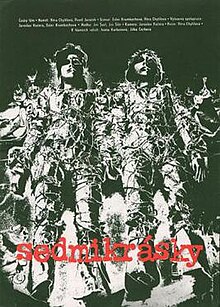
Back الإقحوانات (فيلم) Arabic الاقحوانات ARZ Les margarides Catalan Sedmikrásky Czech Sedmikrásky Welsh Tausendschönchen German Μαργαρίτες (ταινία) Greek Las margaritas (película) Spanish Karikakrad Estonian بابونهها (فیلم) Persian
| Daisies | |
|---|---|
 Theatrical release poster | |
| Directed by | Věra Chytilová |
| Screenplay by |
|
| Story by |
|
| Produced by | Rudolf Hájek |
| Starring |
|
| Cinematography | Jaroslav Kučera |
| Edited by | Miroslav Hájek |
| Music by |
|
Production company | |
| Distributed by |
|
Release date |
|
Running time | 76 minutes[1] |
| Country | Czechoslovakia |
| Language | Czech |

Daisies (Czech: Sedmikrásky) is a 1966 Czechoslovak experimental surrealist comedy film[2][3] written and directed by Věra Chytilová. Widely regarded as a milestone of the Czechoslovak New Wave movement,[4][5] the film follows two young women, both named Marie (played by Jitka Cerhová and Ivana Karbanová), as they engage in a series of bizarre and anarchic pranks.[1] Originally conceived as a satire of bourgeois decadence, the film critiques societal norms and those who rigidly adhere to rules. Chytilová described the film as "a necrologue about a negative way of life."[6] Daisies also subverts traditional gender stereotypes, redefining its heroines on their own terms. The film is noted for its critique of authoritarianism, censorship, and patriarchy,[7][8][9] and it was banned from theaters and export in the Czechoslovak Socialist Republic.[10]
- ^ a b "Daisies". Filmový přehled. NFA. Retrieved 7 March 2020.
- ^ Collins, Patricia (2 September 2020). "Daisies is Art-House Fun ⋆ 3SMReviews.com ⋆ Movie Review". 3SMReviews.com. Retrieved 8 April 2024.
- ^ "Daisies (1966)". 28 September 2020.
- ^ Soukup, Katarina (1 September 1998). "Banquet of Profanities: Food and Subversion in Vera Chytilová's 'Daisies'". Tessera. doi:10.25071/1923-9408.25123. ISSN 1923-9408.
- ^ Gester, Julien (26 November 2013). "Les petites pétroleuses de Prague". Libération (in French). Retrieved 14 August 2021.
- ^ Anderson, Melissa (4 July 2012). "Mod Madness from Vera Chytilová's New Wave Daisies". The Village Voice.
- ^ "Farewell, FilmStruck: A Bittersweet Guide to the Movies to Catch Before It's Gone". The New York Times. 29 October 2018. Retrieved 7 October 2021.
Chytilova doesn't indulge in free-form quirkiness for its own sake. The movie is a puckish poke at authoritarianism of all stripes, from the patriarchy to the Iron Curtain bureaucracy.
- ^ Owen, Jonathan L. (2011). Avant-Garde to New Wave: Czechoslovak Cinema, Surrealism and the Sixties (NED - New edition, 1 ed.). Berghahn Books. ISBN 978-0-85745-126-2. JSTOR j.ctt9qd7tp.
- ^ Raup, Jordan (9 August 2018). "The Power of the Powerless: Banned Films from the Czechoslovak New Wave Returns September 21". Film at Lincoln Center. Archived from the original on 18 January 2019. Retrieved 6 October 2021.
The Czechoslovak New Wave was one of the most radical and brilliant bursts of creativity in film history... Despite stifling restrictions, an intrepid generation of filmmakers continued to challenge Communist censorship by creating art that was provocative, satirical, and deeply critical of authoritarianism.
- ^ Rapold, Nicolas (29 June 2012). "An Audience for Free Spirits in a Closed Society". The New York Times. Retrieved 6 October 2021.